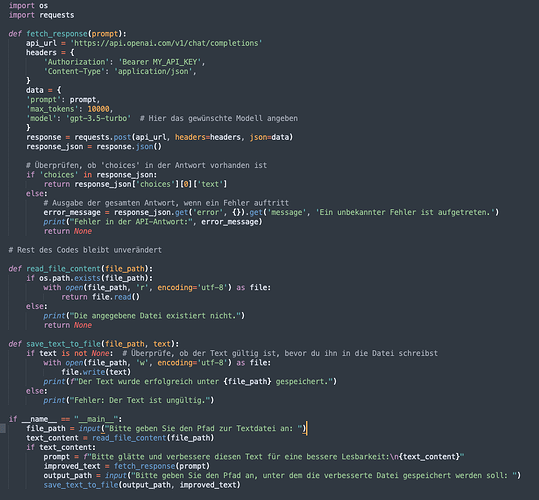The problem is you are using an AI to write your code for you.
It doesn’t know how to use the API properly.
I thought I could expand on your code a bit, to make sure you have “messages” in the proper format. Plus a bit more.
import requests
import os
from typing import Optional
def get_openai_response(user_message: str,
system_message: Optional[str] = "You are an AI text processor.",
api_key: Optional[str] = os.getenv('OPENAI_API_KEY', 'sk-12345-key'),
http_openai_endpoint: Optional[str] = 'https://api.openai.com/v1/chat/completions',
model: Optional[str] = "gpt-3.5-turbo",
top_p: Optional[float] = 0.9,
max_tokens: Optional[int] = 1234) -> str:
"""
This function sends a POST request to the OpenAI API and returns the response.
Parameters:
user_message (str): The message from the user.
system_message (str, optional): The system message. Defaults to "You are Bio 101 bot.".
api_key (str, optional): The API key. Defaults to the value of the environment variable 'OPENAI_API_KEY' or 'sk-12345-key' if the environment variable is not set.
http_openai_endpoint (str, optional): The OpenAI API endpoint. Defaults to 'https://api.openai.com/v1/chat/completions'.
model (str, optional): The model to use. Defaults to "gpt-3.5-turbo".
top_p (float, optional): The top_p value. Defaults to 0.9.
max_tokens (int, optional): The maximum number of tokens. Defaults to 1234.
Returns:
str: The response from the API.
"""
# Prepare the body of the HTTP POST request that will be sent by the requests module
http_body_dictionary = {
"model": model, # This is the AI model compatible with the Chat Completions endpoint
"top_p": top_p, # Nucleus samping: Range 0.0-1.0, where lower number reduce bad tokens
"max_tokens": max_tokens, # This sets the maximum response the API will return to you
"messages": [ # This is the list of messages format that Chat Completions requires
{
"role": "system", # A system message gives the AI its identity, purpose
"content": [
{
"type": "text",
"text": system_message
},
]
},
{
"role": "user", # A user message provides a task or query
"content": [
{
"type": "text", # this format prepares you for sending images also
"text": user_message
},
]
}
],
}
# Prepare the headers of the HTTP request that will be sent by the requests module
http_headers_dictionary = {
"Authorization": f"Bearer {api_key}",
"Content-Type": "application/json"
}
try:
# Send the HTTP request and get the response, in an error-catching container
response = requests.post(
http_openai_endpoint,
headers=http_headers_dictionary,
json=http_body_dictionary
)
# If the request was successful, return the response
response.raise_for_status()
return response.json()["choices"][0]["message"]["content"]
except requests.exceptions.HTTPError as http_err:
print(f"HTTP error occurred: {http_err}")
except Exception as your_screwup:
print(f"An error occurred because of {your_screwup}")
def read_file_content(full_file_path: str) -> str:
"""
This function reads the content of a file.
Parameters:
full_file_path (str): The path to the file.
Returns:
str: The content of the file.
"""
try:
with open(full_file_path, 'r') as file:
content = file.read()
return content
except FileNotFoundError:
print(f"The file {full_file_path} does not exist.")
except IOError:
print(f"There was an error reading the file {full_file_path}.")
def save_text_to_file(full_file_path: str, ai_output_text: str, file_suffix: str = "-processed.txt"):
"""
This function writes text to a file.
Parameters:
full_file_path (str): The path to the file.
ai_output_text (str): The text to write to the file.
file_suffix (str, optional): The suffix to append to the file name. Defaults to "-processed.txt".
"""
output_file_path = full_file_path + file_suffix
try:
with open(output_file_path, 'w') as file:
file.write(ai_output_text)
print(f"Text successfully saved to {output_file_path}")
except IOError:
print(f"There was an error writing to the file {output_file_path}")
if __name__ == "__main__":
filename = input("AI text formatter. Input your file name to be processed:\n>>>")
try:
text_content = read_file_content(filename)
if text_content is not None:
user_message = ("Improve the structure of this text, formatting into paragraphs:\n" +
text_content)
response_text = get_openai_response(user_message)
print(f"got {response_text[:60]}...saving") # preview of text start
save_text_to_file(filename, response_text)
except Exception as e:
print(f"An error occurred: {e}")
Since I don’t speak German to know if an AI provided an accurate translation, I’ll let you turn some of this into German.
The openai library module may be a bit easier to use, but using the requests library as you do will ensure it doesn’t break on the whims of OpenAI pypi maintainers.
